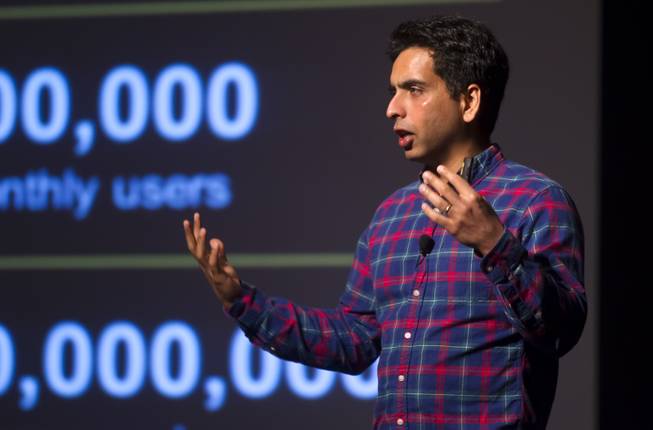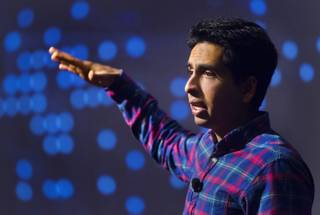
Sal Khan, the founder of Khan Academy and one of TIME Magazine’s “100 Most Influential People”, brings his entrepreneurial spirit and groundbreaking approach to education to Las Vegas on Monday, May 5, 2014. He speaks about online education and financial literacy during WACUBO14 at the J.W. Marriott.
Tuesday, May 6, 2014 | 2 a.m.
Khan Academy is at the forefront of a digital revolution in American education.
What started as an innovative way for founder Salman Khan to tutor his cousins through YouTube lessons has become a renowned online school whose mission is to deliver a “free, world-class education to anyone, anywhere.”
Each month, more than 10 million people visit Khan Academy’s website, which hosts hundreds of instructional videos, online tutorials and quizzes. Through Khan Academy, students from Minneapolis to Mongolia have mastered challenging concepts in math, science, economics, humanities and computer science.
Khan was in Las Vegas this week to deliver the keynote address to 400 university administrators attending the Western Association of College and University Business Officers’ annual conference. During his hourlong talk, Khan spoke about the growing role of online education in schools and universities across the country, including Las Vegas.
This interview has been edited for clarity and brevity.
School districts and colleges are experimenting with “blended” classrooms and Massive Open Online Courses (MOOCs). What are the benefits and challenges with online courses?
Online education presents new opportunities and new problems. Students can learn at their own pace, meeting them where they are. It can free up class time for more dialogue, interactive projects and deeper experiences. However, bridging the digital divide is a very real issue. About 30 percent of families don’t have the Internet or a computer at home, and that’s the 30 percent that really needs it. We’re working with school districts to encourage schools to keep their computer labs open longer, but there’s not an easy solution.
How will online courses change the American education system?
I think in the next 10 years, you’re going to have schools that are hopefully more interactive and fun. Higher education, which is uniform right now, will have a lot more variety. There are going to be some universities that really thrive in this environment, but there are many that will suffer because they’re not reinventing themselves. I don’t see any reason why there should be a 300-person lecture hall anymore.
Do you think online courses will replace traditional classrooms and lecture halls?
We think it’s a bad idea to replace the brick-and-mortar schools. When I think about what I want for my own kids’ education, I want them to go to a physical school. But I hope teachers can leverage resources like the Khan Academy so that class time isn’t (spent) on lecture and the classroom isn’t about passivity. The kind of school I imagine my children going to spends most of the day on inquiry, project-based learning and collaboration with peers. I want my kids to be in an environment where they are encouraged and, to some extent, pushed to become self-learners. That’s the most important thing a school can do.
What’s an example of a school that does this effectively?
The University of Waterloo. It’s the MIT of Canada. Most colleges in the U.S. are two-thirds lecture hall, one-third internship. Waterloo is the other way around. If you go to Silicon Valley right now — Google, Facebook, even our offices — most interns are from Waterloo. A lot of them graduate with six, seven job offers lined up and savings because they’ve had these incredible experiences traveling around the world for internships. I can imagine more colleges and universities moving to models like that, doing more enriching things in the classrooms so they work with each other and the professor. I think universities that do that well show their value proposition, and they’ll do just fine.
What’s the future of online education? What’s next for Khan Academy?
It’s hard to make predictions, but one prediction I can make with absolute certainty is that in the next five years, for pretty much anything that someone wants to learn, there will be some online resource for it. At Khan Academy, we’re starting to think about social. If there are learners in your neighborhood, you can create a cohort of people you can work with. You’re always going to be more motivated to learn with people, and you see that in fitness. It’s now less about content, but more about driving motivation.
Khan Academy recently announced several new partnerships. You’re working with testmaker CollegeBoard to create a free, online SAT-prep course. You’ve also enlisted the help of Bank of America to launch new online financial literacy courses, at BetterMoneyHabits.com. Can you tell me a little more about these partnerships?
CollegeBoard partnered with us to create free, world-class test prep for the new SAT. We want test prep to be more than tips on good guessing, but helping students understand the underlying concepts. Hopefully, this will level the playing field for students.
Las Vegas was ground zero for what can happen when a lot of core financial skills aren’t there. I don’t blame people who got a little over their heads. There were plenty of sophisticated people who got caught up in the housing bubble. It was a nationwide phenomenon. I put financial literacy up there with law, statistics and computer science as something people need to know to participate in society in a meaningful and productive way. It’s up there.


Join the Discussion:
Check this out for a full explanation of our conversion to the LiveFyre commenting system and instructions on how to sign up for an account.
Full comments policy